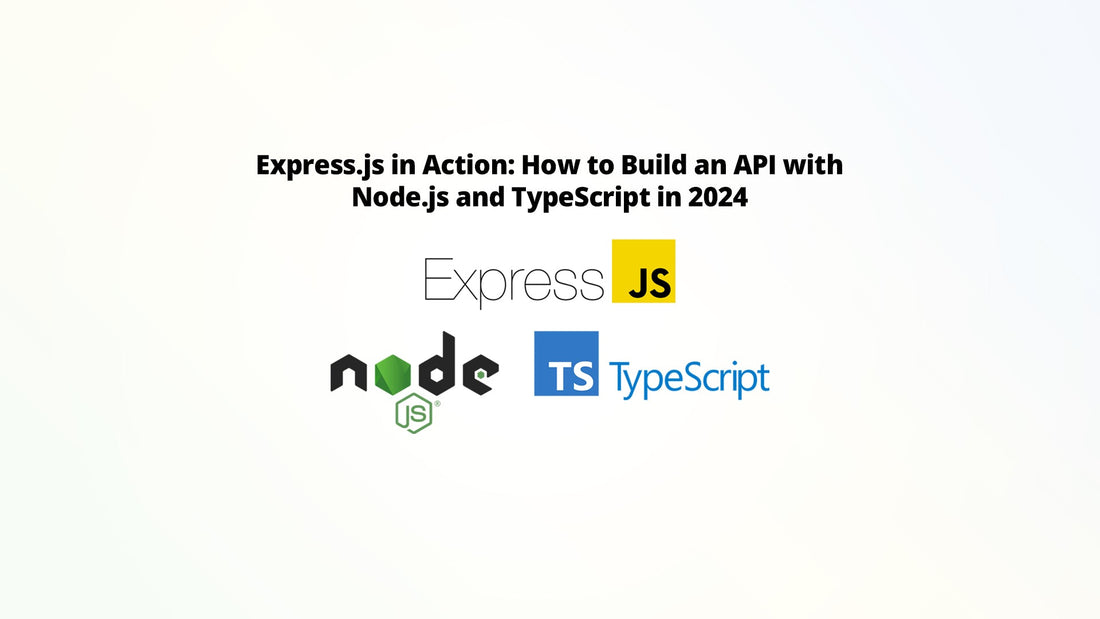
Express.js in Action: How to Build an API with Node.js and TypeScript in 2024
In the world of modern web development, creating robust and scalable APIs is essential. Node.js, with its asynchronous, event-driven architecture, paired with the powerful typing capabilities of TypeScript, offers a fantastic environment for building APIs. In this guide, we'll walk through the process of setting up an API using Node.js and Express.js with TypeScript.
Why Choose Node.js, Express.js, and TypeScript?
Node.js
Node.js is a runtime environment that allows you to execute JavaScript on the server side. Its non-blocking I/O model makes it efficient and suitable for real-time applications.
Express.js
Express.js is a minimal and flexible Node.js web application framework that provides a robust set of features for building web and mobile applications.
TypeScript
TypeScript is a statically typed superset of JavaScript that compiles to plain JavaScript. It helps catch errors early through type checking and improves the developer experience with features like IntelliSense.
Prerequisites
Before we start, ensure you have the following installed on your machine:
- Node.js (version 18 or later)
- npm (Node package manager)
- TypeScript (globally installed via npm)
```bash
Install Node.js and npm from https://nodejs.org/
Install TypeScript globally
npm install -g typescript
```
Step 1: Setting Up Your Project
Create a new directory for your project and navigate into it:
```bash
mkdir express-api-ts
cd express-api-ts
```
Initialize a new Node.js project:
```bash
npm init -y
```
Install the necessary dependencies:
```bash
npm install express
npm install --save-dev typescript @types/node @types/express ts-node-dev
```
Create a `tsconfig.json` file for TypeScript configuration:
```json
{
"compilerOptions": {
"target": "ES2020",
"module": "commonjs",
"strict": true,
"esModuleInterop": true,
"skipLibCheck": true,
"outDir": "./dist",
"rootDir": "./src"
}
}
```
Step 2: Building the API
Project Structure
Organize your project structure as follows:
```
express-api-ts/
├── src/
│ ├── index.ts
│ ├── routes/
│ │ └── user.ts
├── package.json
├── tsconfig.json
```
Creating the Express Server
In `src/index.ts`, set up the Express server:
```typescript
import express, { Application, Request, Response } from 'express';
const app: Application = express();
const port: number = 3000;
// Middleware to parse JSON requests
app.use(express.json());
app.get('/', (req: Request, res: Response) => {
res.send('Hello, TypeScript with Express!');
});
// Import routes
import userRoutes from './routes/user';
app.use('/api/users', userRoutes);
app.listen(port, () => {
console.log(`Server is running on http://localhost:${port}`);
});
```
Creating Routes
Create a `src/routes/user.ts` file for user-related routes:
```typescript
import { Router, Request, Response } from 'express';
const router: Router = Router();
// A simple GET endpoint
router.get('/', (req: Request, res: Response) => {
res.json({ message: 'GET all users' });
});
// A simple POST endpoint
router.post('/', (req: Request, res: Response) => {
const { name, email } = req.body;
res.json({ message: 'User created', user: { name, email } });
});
export default router;
```
Step 3: Running the Server
Modify your `package.json` to include a start script:
```json
"scripts": {
"start": "ts-node-dev --respawn src/index.ts"
}
```
Now, run your server:
```bash
npm start
```
You should see output indicating that your server is running:
```
Server is running on http://localhost:3000
```
Testing Your API
Use a tool like Postman or curl to test your API endpoints.
GET all users
```bash
curl http://localhost:3000/api/users
```
Expected response:
```json
{
"message": "GET all users"
}
```
POST a new user
```bash
curl -X POST http://localhost:3000/api/users -H "Content-Type: application/json" -d '{"name": "John Doe", "email": "john@example.com"}'
```
Expected response:
```json
{
"message": "User created",
"user": {
"name": "John Doe",
"email": "john@example.com"
}
}
```
Conclusion
In this tutorial, we've covered the basics of setting up an Express.js API using Node.js and TypeScript. This setup forms a strong foundation for building more complex and scalable applications. Happy coding!
